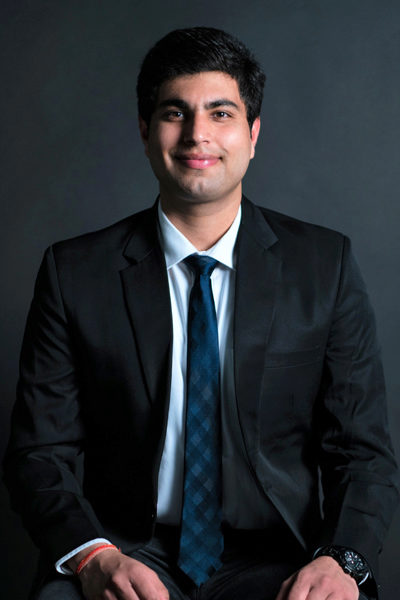
To help illustrate where the pursuit of innovation management can lead, our Innovation Pathways series asks our current students, recent graduates, and established alumni to describe their journeys. This Q&A features graduate student Rahul Sharma (GME’20).
You’re an engineering student — what drew you to the study of innovation management?
From an early point, my goal has been to commercialize technologies in pursuit of solving real-world problems. Not all problems can be solved with well-established and well-tested approaches; new technologies and innovative applications are needed to solve issues that stem from rapid technological development. For this reason, I wanted to learn to recognize and manage technologies which have the potential to bring about positive change.
Apart from this, the advent of Industry 4.0 centers around the accumulation of data, processing or manipulating it, and then gaining useful insights from the process. The way businesses operate and industries are run is changing rapidly. Established companies are feeling the need to integrate things like data mining and machine learning into their processes, and they’ve started deploying these technologies in critical decision making. I want to explore how these technologies affect business processes and problem solving in companies which are newly exposed to them. Since some of these companies’ problems require novel applications of data handling techniques, I want to learn the best possible approach for finding solutions.
How have you been involved with the Mack Institute?
My main involvement was through the Collaborative Innovation Program (CIP). I joined a team of students tasked as consultants to one of the largest luxury automakers in the world. CIP was definitely a pivotal step in my graduate studies at Penn, as it gave me the opportunity to learn from extremely skilled and talented individuals in Wharton’s executive MBA program. Apart from learning from my teammates and the faculty at the Mack Institute, we got to solve a genuine problem and multiple related issues plaguing the automaker, and I got to interact with and learn from its top management.
Because we were working to solve an actual problem for a well-established company, we had to consider practicality from the company’s perspective in everything we did. As a result, I gained flexibility in the type of approaches I take to solve a problem, depending on who the solution is for. This was huge for me. The biggest takeaway was learning to formulate as many questions as I think are required and pushing the client towards answering them. It’s helpful if such a culture of information and data gathering is established early in the project; this leads to discovery of relevant data which would’ve been hidden otherwise.
How did this experience impact your career goals?
Due to successful completion of my team’s CIP goals, I was fortunate enough to receive a chance to intern at the client’s headquarters in Atlanta. This proved to be extremely pivotal. My tasks at the company were closely related to the what I did during the course, which allowed me to work on multiple facets of the same issue.
Apart from working and learning from the awesome people at the firm, I also interacted with people from multiple different companies connected to my work. All this exposure to various departments and their functions changed my outlook on what type of job I would find satisfying. I now have a new channel which has been opened for me that I can nurture and advance. I’m now not just looking to be in the technological space as a single-dimensional expert, but also looking into developing technological solutions and managing their implementation across varied industries.
What other steps have you have taken at Penn to prepare you for managing innovation in your career?
My graduate major is in mechatronics and robotics, and I’ve been exposed to machine learning as part of my curriculum. After my stint in CIP, I realized that it would be extremely valuable for me to expand my knowledge of machine learning and predictive analytics through the lens of operating and managing a business. To this end, I took classes aimed at applying these techniques in the domain of customer segmentation and market analytics. My career prospects have grown significantly as a result of this experience. I now have a solid technological background along with significant real-world knowledge of applying advanced data manipulation and processing techniques for product development and marketing strategy.
Where are you hoping that your career will take you in the next 10 years?
My ultimate goal is to have my very own firm. Which type of firm? I’m not sure. My hopes are set on being able to have expertise in the common problems and issues faced with the ever-expanding horizon of artificial intelligence. For the next decade, though, I would like to be in a position where I design and develop devices that allow firms to collect data, and also to be in a position to gather insights from the collected data.



